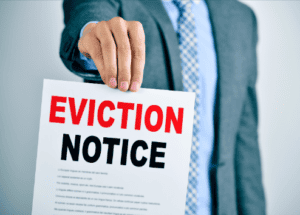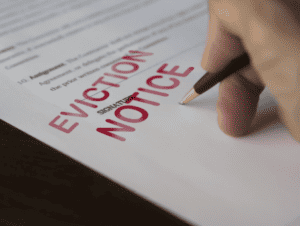
Eviction Process
There are seven steps that have to be followed when dealing with evictions in Florida. Chapter 83 of Florida Statutes states that a homeowner can evict a tenant on the grounds of the following:- Sanitary issues
- Unauthorized occupancy
- Non-payment of rent
Seeking Legal Services
There are legal services that property owners can seek assistance from throughout the eviction process. Seeking legal help can provide insight into what rights the property owner has in regard to the proper evictions. Landlords can find assistance by researching local attorneys who deal in these matters.1. 3-Day notice
A 3-day notice is a type of notice given by landlords to tenants in evictions. This notice requires the tenant to pay the outstanding balance or vacate the property within three days. The 3-day notice is typically given in situations where the tenant has violated the lease agreement in some way. Although a 3-day notice is not considered a legal eviction, it serves as a warning that the landlord intends to begin the eviction process.2. Filing for an Eviction
If the tenant does not vacate the property by the deadline outlined in the notice, then the property owners can file for an eviction. Evictions require filing a legal complaint with the appropriate court in the area where the eviction is taking place. Once the complaint has been filed, a hearing will be scheduled to determine whether an eviction is warranted. Once the hearing takes place, the court will hear both sides and make the final determination.
3. Creating a Hearing Complaint
A “complaint” heading in the eviction notice makes it easy for landlords to identify what issues need to be resolved. A well-documented complaint is an excellent resource if the issue escalates to court, ensuring that your concerns are formally reported when dealing with evictions. Once the decision has been made to file for the eviction, the property owner must create a complaint. In order to start this process, the landlord must have the following information:- Mention of the attempt to evict
- Valid ownership of the property
- Agreement of rental fees
- Documentation of when the last rent was due
- Date the defendant was served
- Request for the judge to hold the defendant responsible
- Have complaint notarized
4. Tenant’s Responsibility
After the tenant has received the eviction papers, they have five working days to respond to them. Evictions are not a simple process, as the tenant has rights as well. The tenant can appeal the decision or pay the balance in full. Although this does not guarantee that the tenant will be fully restored to the rental property, it helps when going into the hearing. From there, the judge will make the final determination, as the landlord and tenant will need to be present and have appropriate representation with them.5. Hearing Notice
As a tenant, being notified of a hearing date and time is critical, as this is the opportunity to defend oneself against eviction. In fact, a hearing cannot take place until the tenant has been served properly with a written notice of the eviction. Upon receiving the notice, tenants can take action, such as:- Filing a response with the court
- Requesting a hearing
- Proposing a solution to avoid eviction
6. File a Motion
A default judgment is a legal ruling issued by a court in favor of the plaintiff (landlord) when the defendant (tenant) fails to appear in court or respond to the summons. This means that the court will automatically rule in favor of the property owner, and the defendant will have to pay the requested damages or lose possession of the property. Default judgments do not automatically mean that the plaintiff will receive the requested amount. They can be challenged if the plaintiff does not follow proper legal procedures or if there is new evidence to present during evictions.7. Judgments
When it comes to evictions, the landlord will have to wait until a judgment has been granted in their favor. If the judge does pass judgment in the landlord’s favor, the next step is the sheriff evicting a renter(s) from the property. The sheriff is required to serve a summons which the landlord is financially responsible for.Local Attorneys in Brevard County
If you’re in Brevard County and have a question about evictions, let the law firm at Lacey Lyons Rezanka answer it for you. We’ll set up a consultation with one of our eviction attorneys and answer any questions or concerns you may have because they can become a complicated matter. You deserve defense in your case, and we can provide you with the peace and mind that you need during this challenging time.Contact an Attorney Today
